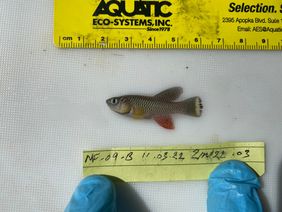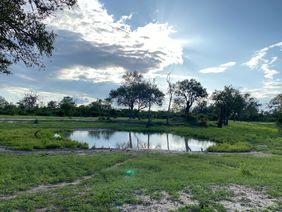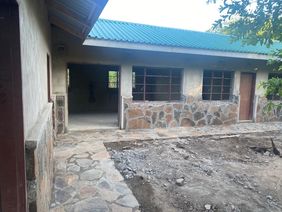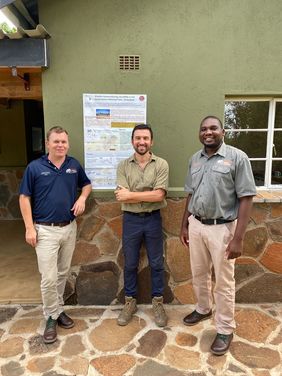Jena/Zimbabwe. The turquoise killifish (Nothobranchius furzeri) lives in ephemeral seasonal ponds in semi-arid areas of Southeast Africa and has adapted perfectly to the constant change between rainy and dry seasons of varying duration. Even under optimal husbandry conditions in the laboratory, its natural lifespan ranges from just a few months to a maximum of one year. As a short-lived vertebrate, this fish is not only genetically very similar to humans, but also ages extremely quickly while exhibiting typical signs of aging. This makes it very interesting for biomedical research on aging, and it is therefore bred at the Leibniz Institute on Aging – Fritz Lipmann Institute (FLI) in Jena for use as a model organism in aging research.
As a result of several expeditions to Southeast Africa, during which FLI researchers studied natural populations of the killifish and collected samples for breeding in Germany, a close cooperation has long existed between the FLI’s Valenzano Research Group and African partners, including the University of Zimbabwe, represented by Prof. Tamuka Nhiwatiwa and Allen Mavuru, MSc., and the Gonarezhou National Park, the second largest national park in Zimbabwe.
The cooperation between the FLI and the Gonarezhou Conservation Trust (GCT), a co-management partnership between the Zimbabwe Parks and Wildlife Management Authority and the Frankfurt Zoological Society based in Chipinda Pools, Gonarezhou National Park, Chiredzi, Zimbabwe, Africa, has now been officially recognized with the signing of a Memorandum of Understanding (MoU).
Important milestone for further cooperation
“The Memorandum of Understanding now signed by both parties establishes the conditions for working even more intensively with our partners in Gonarezhou National Park over the next two years in order to study killifishes even better in their natural environment. Therefore, the agreement is not only a great success for my team, but also for the institute and for future projects,” happily reports Prof. Dr. Dario R. Valenzano, research group leader at the FLI and professor at the Medical Faculty of the Friedrich Schiller University in Jena.
The common goal of the agreement is that both contracting parties will contribute to monitoring the population of the turquoise killifish and its distribution in the Gonarezhou National Park in Zimbabwe. For this purpose, a brand-new field lab is to be set up this year, so that essential and necessary molecular biological routine tests, including DNA sequencing, can be carried out immediately in the Park. “Above all, the new field laboratory is extremely important for our ongoing research projects in the Gonarezhou National Park,” explains Prof. Valenzano, “because in order to study the aging processes of the native killifish populations, we need to know which parasites, microbes, and predators the fish are being exposed to in the wild.”
The validity of the MOU is regulated by the laws of the Republic of Zimbabwe, in addition to relevant multilateral environmental agreements, such as the Nagoya Protocol on Access to Genetic Resources and the Fair and Equitable Sharing of Benefits Arising from their Utilization under the Convention on Biological Diversity. It is therefore an excellent platform for promoting and supporting future projects in the Gonarezhou National Park, as well as for training local staff to carry out the necessary molecular biology work independently on site.
Knowledge about the habitat of the turquoise killifish
For future expeditions to Africa, it will now be easier for FLI researchers to visit ponds where killifishes have already been documented and sampled for scientific research, in order to learn even more about the ecology and natural behavior of the species. Additional ecological data, such as water parameters and information about vegetation and other animals present there, will help deepen the understanding of the fish’s natural habitat and can be integrated into the laboratory breeding. In addition, with the help of National Park rangers, the hope is to locate other new and easily accessible pond habitats where killifishes can also be found.
Ultimately, these goals will lead to a better understanding of how to protect these wild animals in the Gonarezhou National Park and surrounding areas. Moreover, these data are extremely helpful in providing a more complete picture of the vegetation and wildlife, as well as water quality, of the ponds associated with the presence or absence of killifish.
Comparing wild-type variants to captive-bred fish species
“The comprehensive data we obtain by completely monitoring the local environment in the Gonarezhou National Park where turquoise killifish are present will help us to better control the living conditions, including the microbiome of the fish, at the FLI, in order to study how the natural microbiome contributes to host aging,” notes Prof. Valenzano, underlining the significance of the agreement. “Studying killifish in their natural environment will help us to understand the role of ecology in the evolution of short lifespan and rapid aging in this unique group of fish. More broadly, this collaboration will serve as a paradigm for studying the impact of environmental factors – such as climate, the microbiome, etc. – on the evolution of the genetic variants that affect aging.”
“Based on these data, we will be able to learn more about this fascinating fish species, which has been intensively studied in many projects at the FLI as an animal model for aging research,” adds Prof. Dr. Alfred Nordheim, Scientific Director of the FLI. “This not only enables better and more informative comparisons between wild-type variants and our cultured fish species, we can also grasp even more complex correlations between the microbiome and aging by taking into account components of the natural environment of the fish and applying them to our breeding program, in order to derive better and more effective approaches for understanding the aging process in the future.”
Fruitful collaboration – a new field lab
Prof. Valenzano, who returned just a few days ago with his team – Dr. Silvia Cattelan, Samuel Kean, and Allen Mavuru – from a 16-day expedition in Zimbabwe, was excited to see the fantastic work the team at the Gonarezhou Conservation Trust had already done over the past few months in setting up a new field lab. “I thank Bob Mandinyenya, Simon Capon, and Hugo van der Westhuizen for their commitment to this project in setting up a location for our molecular field research in the middle of the National Park in such a short time.”
The laboratory set-up has worked so well that with the support of our two experienced local research assistants, Pardon Hasani and Julius Shimbani, it was already possible to perform a molecular analysis of the current samples collected during this year’s expedition in the laboratory directly on site. “This is really remarkable and has not only saved a tremendous amount of time and logistics but underlines once again the mutual benefit of our deep collaboration in studying the natural habitat of the turquoise killifish. Having access to a lab in the park enables us to generate high-quality data and results directly on site, dramatically speeding up the process of knowledge acquisition while also cutting down on shipping costs.”
Contact
Dr. Kerstin Wagner
Press and Public Relations
Phone: +49 03641-656378, email: presse@leibniz-fli.de












